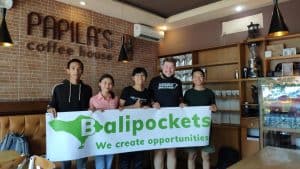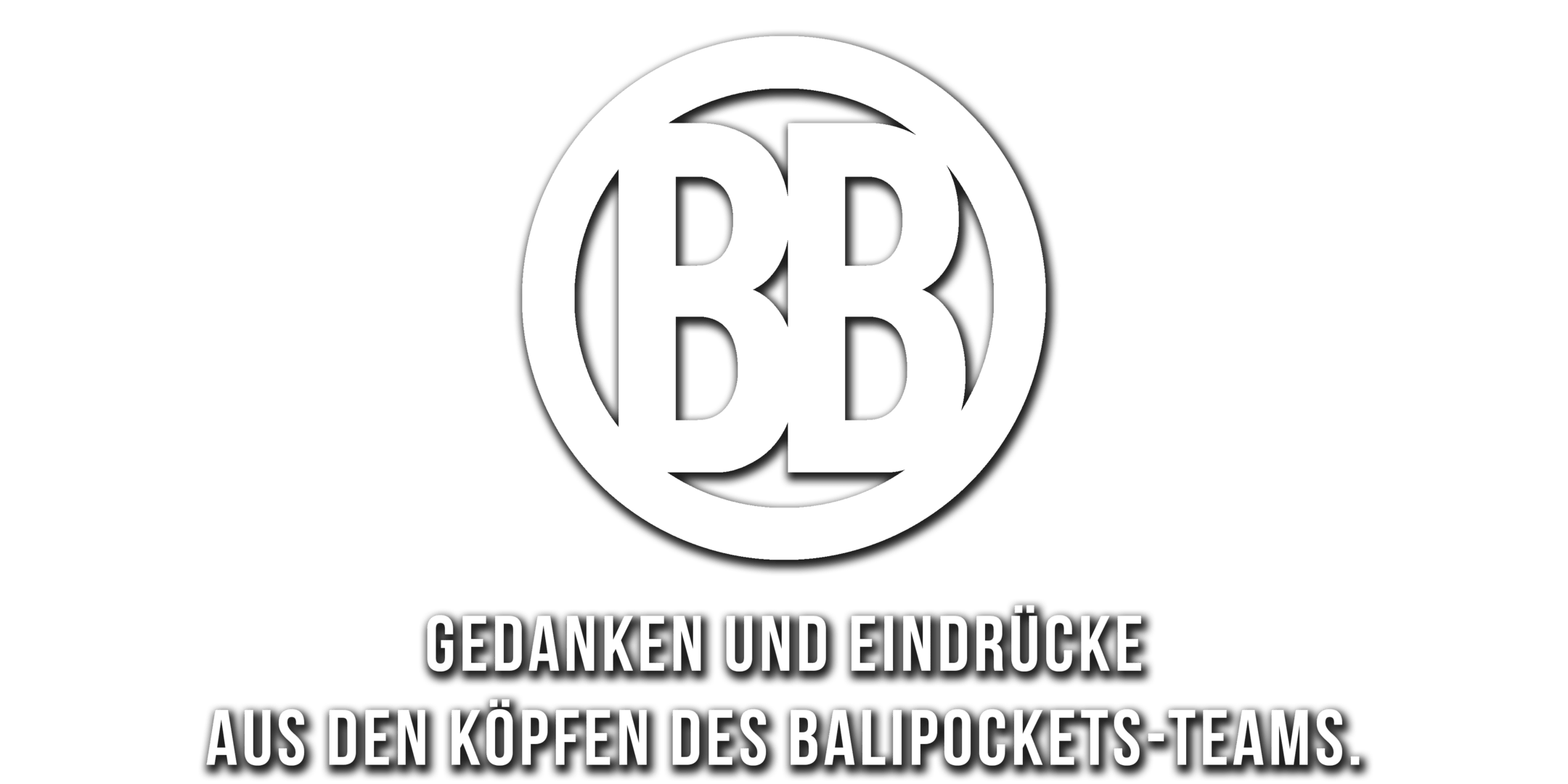
Dieses Bild stammt aus einer anderen Zeit. Einer Zeit, in der noch niemand an Corona dachte. Es zeigt v.l.n.r. unsere Stipendiat:innen Yogi, Sri, Ayu, Daniel und unseren Stipendiaten Nengah beim Projekteinsatz 2019.
Es war das erste Mal, dass Daniel alle Stipendiat:innen gemeinsam getroffen hat. Mittlerweile ist Sri schon fertig mit der Uni. Aber Nengah und Yogi haben noch ein paar Studienjahre vor sich. Bloß: Wie ist das momentan eigentlich mit Uni in Bali?
Das haben wir die beiden gefragt und sie haben uns einen Text geschrieben, den ihr hier lesen könnt.
_____________________________________________________
For English version, see below
_____________________________________________________
Welche Auswirkungen hat Corona auf unsere Stipendiaten? Ein Beitrag von Nengah und Yogi
Der erste Fall von COVID-19 wurde Anfang März 2020 in Indonesien bestätigt. Seitdem hat sich die Pandemie rasch auf alle Regionen in Indonesien ausgeweitet. COVID-19 ist eine Infektionskrankheit, die durch eine Art Coronavirus verursacht wird, die erstmals in Wuhan, China, entdeckt wurde. Im Dezember 2019. Die Verbreitung von COVID-19 hat nicht nur die wirtschaftlichen Aktivitäten und den Verkehrssektor, sondern auch den Bildungssektor tiefgreifend beeinflusst. Um die Verbreitung von COVID-19 zu verhindern, empfiehlt die Weltgesundheitsorganisation (WHO), große Menschenmengen so weit es geht zu vermeiden. Daher gab die indonesische Regierung – ähnlich wie in anderen Ländern – eine „Social Distancing Policy“ heraus. Später wurde ein Rundschreiben des Ministeriums für Bildung und Kultur und der Direktion für Hochschulbildung (Nr. 1 von 2020) zur Verhinderung der Ausbreitung von COVID-19 in der Bildungswelt herausgegeben. In diesem Rundschreiben weist das Ministerium für Bildung und Kultur an, Fernunterricht zu ermöglichen und von zu Hause aus zu studieren.
Das Studium zu Hause begann Anfang März 2020. Wir nutzten mehrere Plattformen, um online zu lernen. Wir benutzten z. B. Google Classroom, Videokonferenzen, Telefone oder Live-Chats, Zoom, Webex, Google Meet, WhatsApp-Gruppen und Edmodo. Unsere Lehrer stellten uns darüber Materialien oder Tests zur Verfügung oder diskutierten mit uns. Unser Unterricht begann normalerweise um 08:00 und ging bis 13:00 Uhr von Sonntag bis Donnerstag. Am Freitag begann die Vorlesung um 08.00 und endete um 19.00 Uhr. Im November 2020 wurden keine Online-Plattformen mehr verwendet, sondern auf dem Campus wurden wieder Vorlesungen gehalten. Die Covid-19-Gesundheitsrichtlinien wurden allerdings strikt umgesetzt. Jeder Schüler war verpflichtet, eine Maske zu tragen, es durften sich keine Ansammlungen bilden und natürlich galten die Abstands- und Social Distancing-Regeln. Jetzt wurde unsere Universität jedoch wieder geschlossen. Dies ist auf die große Anzahl von Studierenden zurückzuführen, die im Universitätsumfeld mit Covid-19 infiziert sind. Also machen wir jetzt wieder Online-Unterricht von zu Hause aus.
Von dieser Pandemie sind alle Aspekte des Lebens betroffen, insbesondere im Bildungsbereich. Wir als Studenten spüren die negativen Auswirkungen der Covid-19-Pandemie sehr. Lernen und Aufgaben erledigen – das geht nur noch online, von zu Hause aus. Abgesehen davon hat diese Pandemie unsere Pläne auch stark beeinflusst. Wir als Studenten mit Schwerpunkt Tourismus spüren die negativen Auswirkungen sehr. Wir wissen, dass der Tourismus in Indonesien, insbesondere in Bali (wo wir leben), momentan fast als nichtexistent bezeichnet werden kann. Die Pandemie und ihre Vorschriften macht keine Ferien. Die Insel haben in den letzten Monaten absolut keine Touristen besucht. Für uns als Tourismusstudenten haben sich natürlich unsere Pläne, die wir für jetzt und für die Zukunft hatten, entsprechend der aktuellen Situation und den Bedingungen vollständig geändert. Vorher hatten wir geplant, als DW (Daily Worker) in einem Hotel zu arbeiten, um Erfahrungen zu sammeln. Wir hatten mehrere Hotels für Schulungsorte vorbereitet… Aber jetzt scheinen unsere Pläne aufgrund dieser Pandemie nicht in Erfüllung zu gehen. Trotzdem versuchen wir positiv zu bleiben und kreativ zu werden, um neue Chancen zu erkennen und andere Pläne zu schmieden.
Obwohl alle unsere Aktivitäten nur von zu Hause aus erledigt werden können, ist es trotzdem möglich, neue Dinge auszuprobieren, um unser Wissen zu erweitern und neue Fähigkeiten zu entwickeln. Das wird auf jeden Fall sehr nützlich sein. Wir führen häufig Umfragen durch. Darüber hinaus lernen wir auch viel im Bereich der Informationstechnologie dazu, z. B. das Erstellen oder Bearbeiten von Designs. Dafür schauen wir über YouTube und andere Anwendungen einfach Tutorials. Da wir wissen, dass diese Fähigkeiten und Kenntnisse heute und in Zukunft benötigt werden, verfügen wir dann, obwohl wir Tourismus studieren, über zusätzliches technisches Know-How. Daneben lernen wir während der Pandemie auch, mit unseren Eltern im Garten oder auf dem Bauernhof zu arbeiten. Das Wissen, was unsere Eltern und Großeltern als Landwirte gesammelt haben, können wir später mit Geschäftswissen, aus dem Studium verknüpfen. Und wie vermutlich viele während dieser Pandemie scrollen wir auch häufiger durch die sozialen Medien. Natürlich sehen wir dort auch die vielen Online-Geschäftsmöglichkeiten, denen wir folgen können.
Meiner Meinung nach hat die COVID-19-Pandemie sehr große Auswirkungen auf den Bildungssektor in Indonesien. Nur ein Bereich dabei ist die Technologie, die eigentlich jeder Schüler braucht. Da alle von zu Hause aus lernen, sollte man über Kommunikationsmittel wie ein Mobiltelefon und einen Laptop verfügen, um an den Unterrichtsstunden oder Vorlesungen teilnehmen zu können. Online-Kurse bergen auch Hindernisse für uns. Das größte Problem dabei ist die Internetverbindung. Wenn man in einem Dorf und weit weg von der Stadt lebt, ist die Internetverbindung langsam. Dadurch kommt man oft zu spät zum College oder man ist zu spät dran, um Studienarbeiten einzureichen. Das zweite Problem ist das teure Internetpaket. Um online zu lernen, nehmen wir oft an Kursen mit Google Meet oder Zoom teil. Dadurch ist das Internet natürlich schnell aufgebraucht und man muss ein neues Internetpaket kaufen.
_______________________________________________________________________________
The first case of COVID-19 in Indonesia was confirmed in early March 2020. Since then, the pandemic has spread rapidly to all regions in Indonesia. COVID-19 is an infectious disease caused by a type of coronavirus that was first discovered in Wuhan, China. In December 2019. The spread of COVID-19 has had a profound impact not only on economic activities and the transportation sector but also on the education sector. In an effort to prevent the spread of COVID-19, the World Health Organization (WHO) is concerned about activities that will cause large crowds. Therefore, the Indonesian government issued a social distancing policy, which later issued a Circular of the Ministry of Education and Culture, Directorate of Higher Education No. 1 of 2020 concerning the prevention of the spread of COVID-19 in the world of education. In this circular, the Ministry of Education and Culture instructs to conduct distance learning and study at home.
Study at home started in early March 2020. We used multiple platforms to study online. The platforms that we used such as google classroom, video conference, telephone or live chat, zoom, webex, google meet, whatsapp group, and edmodo. Our teacher will provide us with materials, quizzes, or discussions with students. Our class usually starts from 08.00 am until 01.00 pm on sunday-thursday. On Friday the lecture starts from 08.00 am until 07.00 pm. In November 2020, the lecture no longer used online platforms, but lectures were held on campus, especially practical lectures, by strictly implementing the Covid 19 health protocol. Every student is obliged to wear a mask, may not gather, and apply social distancing. However, this month, our university was closed again, this is due to the large number of students infected with Covid 19 in the university environment. So we went back to doing online class from home.
With this pandemic, all aspects of life are normally affected, especially in the field of education. We as students really feel the negative impact of the covid-19 pandemic, such as studying from home, doing assignments online from home, and moreover this pandemic has greatly affected our plans as students. We, as students who major in tourism, feel the negative impact. We know that tourism in Indonesia, especially in Bali (where we live), can be said to be suspended animation, because absolutely no tourists have visited due to this pandemic which has made regulations appear not to take holidays. We as tourism students, of course, the plans that we have compiled for now and in the future seem to have completely changed according to the current situation and conditions. Previously, we planned to do DW (daily worker) at a hotel to add to our experience, have prepared several hotels for training venues, and so on. But now the plan doesn’t seem to live up to expectations because of this pandemic. However, despite this pandemic, we can take the positive that we as tourism students are required to think creatively and be able to see the opportunities that exist and make other plans for the future.
During this pandemic, even though we just stay at home because all our activities are done from home, we can try new things to increase our knowledge and also add new skills which will definitely be very useful. During this pandemic we often conduct surveys related to existing occupations. In addition, we also learn information technology, such as learning how to make designs, learning editing from home by looking or finding out how to do it through YouTube and other applications. Because we know that skill or knowledge is needed today and in the future, so even though we are tourism students, we have additional skills related to technology. Apart from studying technology, what we do during the pandemic is we learn to garden or farm with our parents. This is the weakness we have from our parents‘ profession as farmers, so that later we can combine business knowledge that we have often heard of with agriculture. And during this pandemic, we also play social media more often, of course, we can see online business opportunities that we can try to follow.
In my opinion, the COVID-19 pandemic has a big impact on the education sector in Indonesia. The impact can be seen from the use of technology. Because studying at home, every student should have communication tools such as a hand phone and laptop to be able to attend the class. Besides that, I can also learn about the use of video conference technology that has never been used in the education sector before. But online classes also have obstacles for me, the biggest obstacle being the internet connection problem. Living in a village and far from the city, make the internet connection is slow, this make me often late for college, or late in submitting assignments. The second obstacle is the expensive internet package. To study online, I often take classes using google meet or zoom, so that my internet package runs out quickly so I have to buy a new one.


